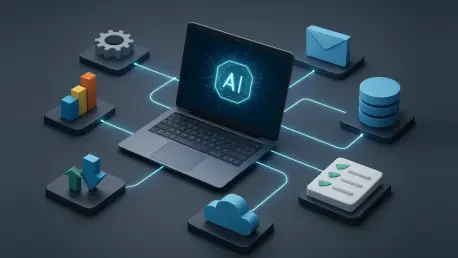In the ever-evolving landscape of technology, artificial intelligence (AI) and cloud services are revolutionizing industries through groundbreaking innovations and strategic investments. Major players in the tech industry, like Oracle Cloud Infrastructure (OCI), are spearheading this transformation with powerful AI-driven solutions, offering businesses the potential for substantial cost savings and enhanced performance. As individuals and companies explore these advancements, they also contend with significant shifts in societal behavior, driven by AI’s burgeoning role across various sectors. This dynamic interplay underscores the transformative power of AI and cloud technologies, shaping the future of how people interact with the digital world.
AI’s Expanding Role in Healthcare and Social Interaction
The impact of AI is palpably felt across diverse fields, notably in personal healthcare and social dynamics. AI is changing traditional healthcare models with tools like ChatGPT, which aids individuals during medical appointments by helping them prepare questions for doctors. Notably, people such as Maya from Ohio have found solace in the assistance provided by AI. The technology offers a sense of control and practical support during challenging periods, showcasing AI’s expanding utility in personal health management. However, it’s important to note the boundaries of AI, as it may not offer solutions for more emotionally complex issues, such as dealing with grief.
Children’s increasingly frequent interactions with AI highlight a growing trend where they seek companionship from chatbots. This reliance depicts a shift in social patterns, where nearly one-third of children converse with chatbots with an imagined level of intimacy akin to friendships. Another quarter of these children engage with AI due to feelings of isolation, marking a significant social phenomenon. Parents face a crucial task in ensuring their children maintain a balance between digital companionship and real-life social connections while navigating the intricacies of this emerging trend, reflecting the evolving discourse around digital interaction and human relationships.
Innovative Trends in AI Applications
The scope of AI applications continues to broaden with remarkable advancements in niche areas like medical diagnostics and retail. One intriguing development is AI’s integration into medical diagnostics, exemplified by a study where dogs, utilizing their keen sense of smell, detected Parkinson’s disease with 80% accuracy. Such innovations, which combine AI with biological sensors, herald a new era of non-invasive medical diagnostics, emphasizing the vast potential of AI in healthcare settings. This example is emblematic of broader trends where technological breakthroughs offer novel solutions to complex medical challenges, fostering optimism for future medical advancements.
In the realm of retail and niche markets, unconventional platforms like Etsy are witnessing financial strain as users invest heavily in intangible guarantees, such as custom spells. This phenomenon highlights societal pressures and the lengths individuals go to in search of assurance amid uncertainty. These decisions bring forth critical considerations about financial prudence and the psychological factors underpinning consumer behavior. Such themes underscore the wider discourse surrounding AI, cloud technologies, and market dynamics, prompting a reevaluation of decision-making processes and resource allocation in an increasingly digital economy.
Investment Trends and AI’s Role in Industries
Exploration of AI-driven investment trends underscores the widespread enthusiasm among investors, despite product maturity concerns. Mira Murati, former CTO and interim CEO of OpenAI, exemplifies this trend, having successfully raised $2 billion for her AI startup, Thinking Machines. This significant financial backing reflects robust investor confidence in the long-term promise of AI technologies and their transformative potential. Such developments highlight the innovative spirit within the tech sector, where strategic investments catalyze rapid advancements and subsequent adoption of emerging technologies.
Industrial applications of AI, such as those in aviation, illustrate the shift toward AI-driven personalized models. Delta Airlines’ adoption of AI to dynamically adjust airfare based on predicted customer spending habits represents a departure from traditional pricing strategies. Such personalized measures offer avenues for optimizing customer experiences while maximizing financial returns. This example is part of a broader narrative where businesses integrate AI into fundamental operations, signaling transformative changes in industry practices. The shift toward automation and AI-driven models heralds profound implications for customer interactions and service delivery.
AI’s Future in Autonomous Technologies and Infrastructure
In today’s rapidly changing technological landscape, artificial intelligence (AI) and cloud services are drastically transforming various industries. These advancements are largely due to groundbreaking innovations and strategic funding efforts. Leading tech companies, such as Oracle Cloud Infrastructure (OCI), are at the forefront of this shift, driving it with robust AI-powered solutions that offer businesses the promise of significant cost efficiencies and improved operational performance. As both individuals and organizations delve into these technological developments, they also navigate major changes in societal habits and behaviors, which are increasingly influenced by the expanding role of AI in different sectors. This powerful interaction highlights the transformative capability of AI and cloud technologies, fundamentally altering the future landscape of digital interactions. Businesses and individuals must adapt to these changes to harness the full potential of these emerging technologies, which are poised to revolutionize how we connect and operate in a digital world.









